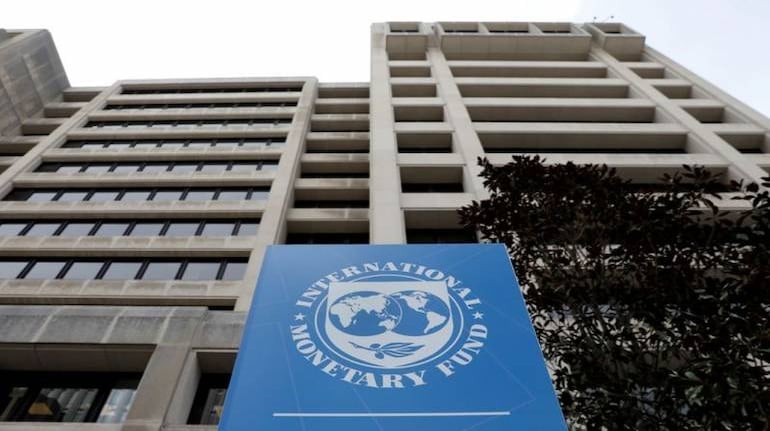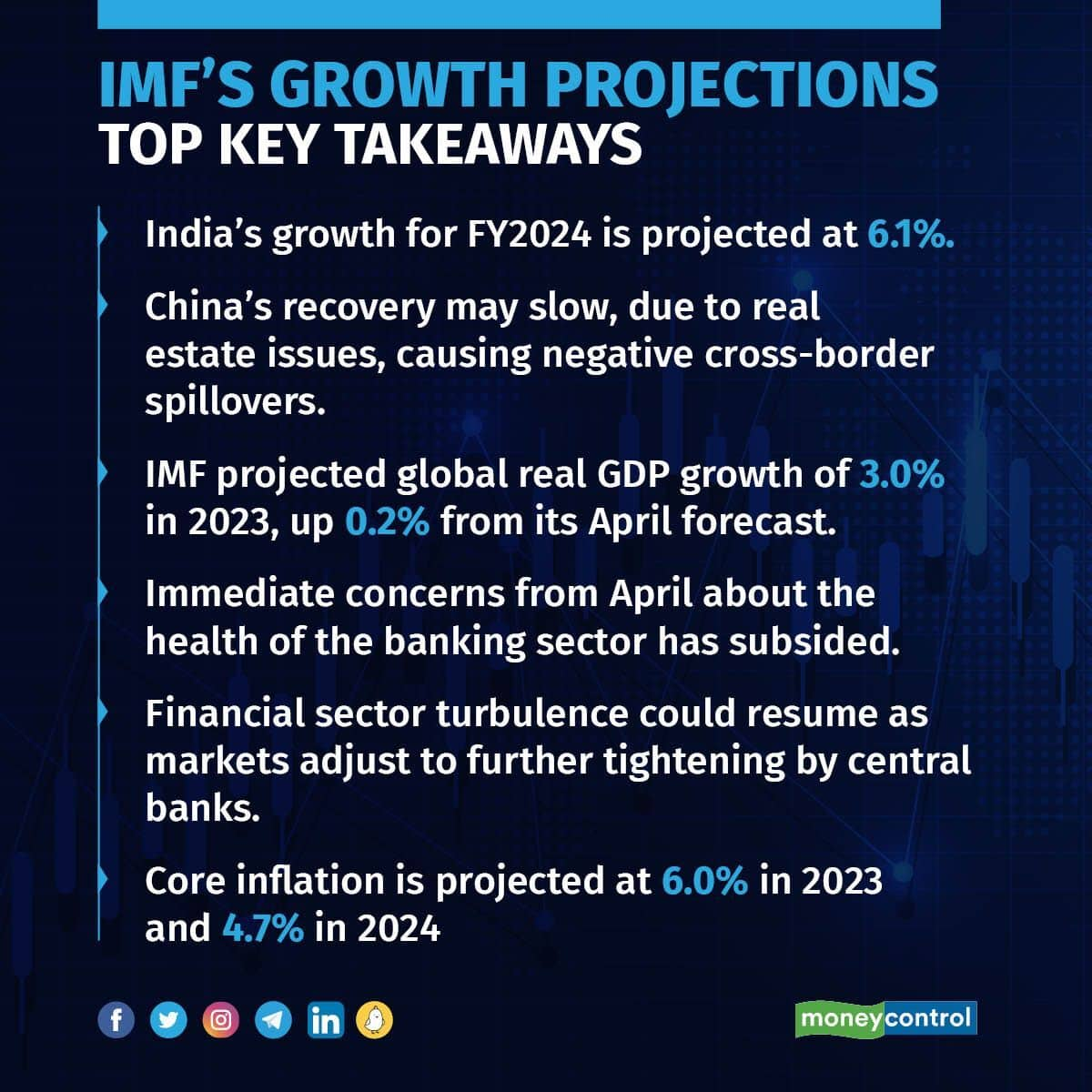



The International Monetary Fund (IMF) has raised its GDP growth forecast for India for 2023-24 to 6.1 percent from 5.9 percent due to the blowout growth number for January-March.
"Growth in India is projected at 6.1 percent in 2023, a 0.2 percentage point upward revision compared with the April projection, reflecting momentum from stronger-than-expected growth in the fourth quarter of 2022 (financial year 2022-23) as a result of stronger domestic investment," the multilateral agency said on July 25 in an update to its World Economic Outlook (WEO) report.
Data released on May 31 showed India's GDP growth for the first quarter of 2023 rose to 6.1 percent, comfortably beating all expectations and forcing the statistics ministry to raise its estimate for growth in 2022-23 by 20 basis points to 7.2 percent.
One basis point is one-hundredth of a percentage point.
The upward revision made by the IMF to India's growth forecast on July 25 reverses its decision from April, when it had cut its projection for 2023-24 by 20 basis points to 5.9 percent.
Despite the course reversal, the IMF is not as upbeat about India as the government or the Reserve Bank of India (RBI), both of whom see the GDP growing by 6.5 percent in 2023-24. As such, the IMF's expectations are more in line with some private sector economists, who see India's growth slowing down sharply to under 6 percent this year on account of weakening global growth prospects following the rapid tightening of monetary policy by central banks across the world to rein in high inflation.
Also Read: India can see China-like high-growth phase for a decade, says CEA NageswaranIndia's growth story has also got a thumbs-up from the new World Bank President Ajay Banga, who said earlier this month during the meeting of G20 Finance Ministers and Central Bank Governors in Gandhinagar, that he is "more optimistic about India today as a whole than I have been for a long time".
The IMF has made no change to its forecast for next year and continues to see India's GDP growing by 6.3 percent in 2024-25.
The upward revision in India's growth forecast by the IMF is in line with its new view on the global economy, which it now expects to grow by 3 percent in 2023, up from the 2.8 percent forecast in April.
| REGION | 2023 GROWTH FORECAST | 2024 GROWTH FORECAST |
| World | 3.0% | 3.0% |
| US | 1.8% | 1.0% |
| Euro area | 0.9% | 1.5% |
| Japan | 1.4% | 1.0% |
| UK | 0.4% | 1.0% |
| China | 5.2% | 4.5% |
| Russia | 1.5% | 1.3% |
| Brazil | 2.1% | 1.2% |
| South Africa | 0.3% | 1.7% |
However, the IMF cautioned that the interest rate hikes announced by central banks to fight inflation continue to weigh on economic activity.
"Inflation remains high and continues to erode household purchasing power. Policy tightening by central banks in response to inflation has raised the cost of borrowing, constraining economic activity. Immediate concerns about the health of the banking sector have subsided, but high interest rates are filtering through the financial system, and banks in advanced economies have significantly tightened lending standards, curtailing the supply of credit," the IMF said.
While the world growth forecast for 2023 was raised, that for 2024 was retained at 3 percent, meaning the IMF expects global growth to plateau in the near term.
"The balance of risks to global growth remains tilted downward, but adverse risks have receded (since April)," the IMF said, referring to the resolution of US debt ceiling tensions and action to alleviate banking sector problems in the US and Europe.
Like the global economy, the IMF now expects the US to grow faster in 2023 than previously expected, raising its forecast by 20 basis points to 1.8 percent. However, it cut the forecast for 2024 by 10 basis points to 1 percent.
The Euro area, meanwhile, got a 10-basis-point bump-up for both 2023 and 2024 to 0.9 percent and 1.5 percent, respectively. There was no change made to China's growth forecast of 5.2 percent and 4.5 percent for 2023 and 2024, respectively. However, the IMF said there was a change in the composition of Chinese growth.
 IMF Projection Highlights
IMF Projection Highlights"Consumption growth has evolved broadly in line with April 2023 WEO projections, but investment has underperformed due to the ongoing real estate downturn in that country. Stronger-than-expected net exports have offset some of the investment weakness, although their contribution is declining as the global economy slows," the IMF said.
Inflation concernsReiterating recent comments by its Managing Director Kristalina Georgieva, the IMF said on July 25 that the priority for most economies remains achieving sustained disinflation.
"Central banks in economies with elevated and persistent core inflation should continue to clearly signal their commitment to reducing inflation," the IMF said.
The agency expects global headline inflation to fall from 8.7 percent in 2022 to 6.8 percent in 2023 and 5.2 percent in 2024, with core inflation seen declining more gradually from 6.5 percent in 2022 to 6 percent in 2023 and 4.7 percent in 2024.
"It (core inflation) is proving more persistent than projected, mainly for advanced economies, for which forecasts have been revised upward by 0.3 percentage point for 2023 and by 0.4 percentage point for 2024 compared with the April 2023 WEO. Global core inflation is revised down by 0.2 percentage point in 2023, reflecting lower-than-expected core inflation in China, and up by 0.4 percentage point in 2024," the IMF said.
Discover the latest Business News, Sensex, and Nifty updates. Obtain Personal Finance insights, tax queries, and expert opinions on Moneycontrol or download the Moneycontrol App to stay updated!
Find the best of Al News in one place, specially curated for you every weekend.
Stay on top of the latest tech trends and biggest startup news.